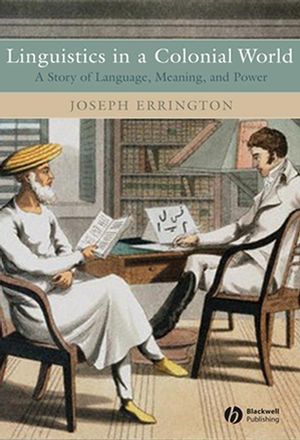Linguistics in a Colonial World: A Story of Language, Meaning, and PowerISBN: 978-1-4051-0569-9
Hardcover
212 pages
September 2007, Wiley-Blackwell
 This is a Print-on-Demand title. It will be printed specifically to fill your order. Please allow an additional 10-15 days delivery time. The book is not returnable.
Other Available Formats: Paperback
|
||||||
"Errington … provides a useful overview of analytical and methodological developments and changing applications in the history of linguistics. Highly recommended." (CHOICE, November 2008)
"The succinctness of the writing and the importance of the central argument make the reviewed text likely to appear on many course syllabi." (Journal of Sociolinguistics)
"This book provides both an introduction and an innovative argument about the development of colonial linguistics and its place in the rise of 19th century European linguistics as a field of expert knowledge. This is stimulating scholarship and a valuable teaching resource for linguistic anthropology, sociolinguistics, history of linguistics, cultural studies and historiography."Kathryn Woolard, University of California: San Diego
"This splendid history of ideas is a nuanced reflection on how
language and humanity became each other's deepest theoretical
mirrors as the world made the transition from colonialism to the
more recent forms of globalization. It is also a superb
contribution to the general dialogue between linguistics and its
cognate human sciences."
Arjun Appadurai, The New School
"In this concise, eloquent yet wide-ranging book, Joseph
Errington demonstrates the importance of understanding linguistics
as a special kind of colonial encounter. Linguistics, he shows, has
always operated within particular relations of power, constructs of
sameness and difference, and ways of reducing languages to writing.
The European science of language helped legislate on the one hand
national difference in Europe and on the other human inequality in
European empires. Linguistics, Errington shows, may claim
scientificity but it can never be insulated from the speech of
those it studies; it is always entangled with contexts, projects
and linguistic ideologies from the past. This book therefore
provides not only key historical discussion of the long and fraught
connections among colonialism, linguistic description, literacy
practices, and social imaginations, but also challenges any
contemporary practising linguist – whether engaged in
pan-human speculations about universal language, continuing
missionary linguistic projects, or attempts to save and preserve
endangered languages – to understand current postcolonial
linguistic projects in relation to the colonial past."
Alastair Pennycook, University of Technology-Sydney



